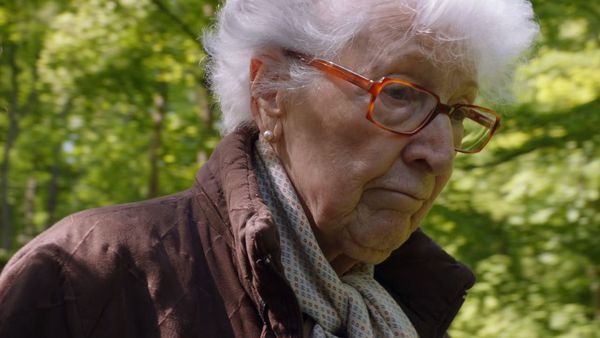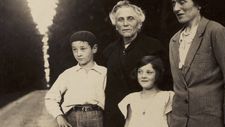In Anthony Giacchino’s inspiring Oscar-nominated Best Documentary Short, Colette, produced by Alice Doyard, we meet 90-year-old Colette Marin-Catherine, a remarkable woman, who shares with us a journey into a private reckoning that reflects the history of the 20th century. Together with 17-year-old student historian Lucie Fouble, Colette for the first time crosses the border from France into Germany to visit the location of the concentration camp Dora-Mittelbau in Thuringia, where her brother Jean-Pierre was sent after he had been arrested in Normandy as a member of the Resistance. He was 17 when he arrived at Dora on February 11, 1945 and died only weeks before the camp was liberated by the Allies.
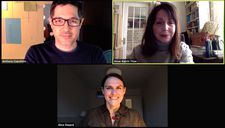 |
| Colette producer Alice Doyard with Anthony Giacchino and Anne-Katrin Titze on Colette Marin-Catherine: “When you do a film with someone who gives so much, you want to take care of her.” |
Colette, who is very verbal about her disgust for any kind of “morbid tourism,” trusts her young travel companion, Lucie, as both are holding on to each other for physical and emotional support. They enter the infernal tunnel in the mountain where, in 24-hour shifts of forced labour, the V-2 rockets were built by the prisoners. The images we see of landscape, marked by traces of the horrors that had taken place there, together with the voiced recollections by Colette, connect to the large questions looming again over our time. When deception and hunger for power, when blindness in the right eye and displacement of truth threaten to take over, the world needs voices of bravery, just like Colette’s.
From London, Alice Doyard, and from New York, Anthony Giacchino, joined me on Zoom for an in-depth conversation on Colette.
Anne-Katrin Titze: Alice, you are in London?
Alice Doyard: Exactly! Thank you for hosting us tonight!
AKT: And Anthony, you’re in New York as well?
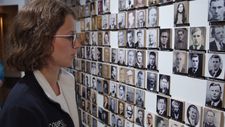 |
| Researcher Lucie Fouble at the World War II Museum La Coupole |
Anthony Giacchino: I am in New York.
AKT: Congratulations on the Oscar nomination for Colette! It must have been wonderful to hear for you.
AG: Yes, of course, it was. You know, we watched the announcement live with Colette.
AKT: Oh, great.
AD: We shared the screen.
AG: We considered it - should we do this or not. And we felt we really have to do this with her. And she was, as Alice said, the most stoic among us when the announcement came.
AKT: It doesn’t surprise me, I mean, she’s such a formidable woman. She has such wonderful character that comes through in every part of the film. How did you meet her? How did it all come about? Was it first Colette? First Lucie? How did you find both of them?
AG: It was Colette first, and then Lucie. They meet for the first time in our film, when you see it, when Lucie visits Colette’s apartment.
AKT: When she offers Lucie coffee and she says no.
AG: Yes, exactly. It was a chance meeting with Colette. Alice and I were in Normandy, sort of scouting ideas for films and a tour guide who was showing us around said he knows this woman who was in the Resistance, her name is Colette, he could introduce us. It was that simple.
AD: We were doing portraits of former heroes of World War II and we thought that someone in the Resistance, particularly a woman, would be an amazing portrait. So we made an interview with Colette and we thought an interview is not enough for such a strong character with such an amazing voice. Authoritative and yet very tender, very precise in her memory of the war and also very open to transmit and to hear, to give and to hear what we wanted from her. We were seduced by the character. So we thought, what do we do? We have someone we have been touched by deeply, is there a story we can do with her and build the story around her?
AKT: So you were the ones connecting her to Lucie?
AD: Oh yes. We thought it would be a good idea. Among the things she wanted to do is to pay tribute to her brother Jean-Pierre. Obviously we researched everything we could about Jean-Pierre. During that research we end up at La Coupole and this group of researchers that were writing a book about former deportees to Dora. And among these deportees there was Jean-Pierre and among the writers on this big book there was Lucie, the youngest one, who had never been to a concentration camp and wanted to go there. We thought, maybe Colette will take Lucie. We had built a strong bond of trust and Colette had made up her mind with going to Dora, if it was for something that would make sense to her. And taking Lucie, a young historian, would make sense to her.
AKT: It’s a perfect combination. The chemistry between the two of them is remarkable. Before we get to the structure of your film, what did Colette do after the war?
AD: She was a nurse. When the [D-Day] landing happened, she was in Bréville, in her family house with her mother and they saw injured people coming to the house and they brought some of them to the military hospital of Bayeux. Colette was 15 and when she and her mother arrived there it was just chaotic. And the doctors and the nurses said, “Oh, the bandages you did are so well done, we keep you here so that you help us take care of the injured people.” And they stayed there for many months to work there, the mother as head nurse and Colette as a help-nurse.
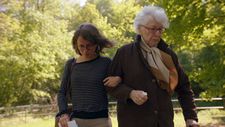 |
| Lucie Fouble with Colette Marin-Catherine at concentration camp Dora-Mittelbau |
AG: That’s where Colette would say that she did the most work during the war, as part of this effort to help the Allies after the landing. In the film she does play down her work, her brother was the one who was really doing stuff, but there were small acts of resistance that had huge impact. For example, it was illegal to decorate in any way the grave of anyone who had been executed for Resistance activities. Colette would secretly make little bouquets that her brother then in the middle of the night would bike over to graves. In my mind that’s a huge act of resistance for a fourteen-year-old. In fact, that’s how Jean-Pierre got caught. They figured out who put the flowers on the graves and he was arrested while he was at school. And then they kind of unravelled that network.
AKT: That fills in a gap when you have that Sophie’s Choice moment, when Colette recalls her mother saying “It should have been you.” Instead of her brother. It is so so powerful, especially with the next sentence when she says that her mother probably forgot it the minute after, whereas it haunted the rest of her life.
AG: That’s an interesting story how she revealed that to us. Although we placed that story on the train, it plays out more like this is still going through her head. She doesn’t actually tell that story to Lucie. We actually didn’t find out about that story until after she came back from Dora. Alice, you were there with her.
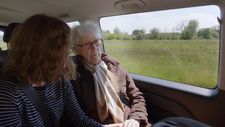 |
| Lucie Fouble and Colette Marin-Catherine on their way to the concentration camp Dora-Mittelbau in Thuringia, where Colette’s brother Jean-Pierre was sent. |
AD: When you do a film with someone who gives so much, you want to take care of her. We took care of Colette before, during, and after, until now. We took her back home to Caen, after Germany. And she said, “You know, I am very happy, because there is something heavy on my mind and I have the feeling that I might have made peace with this. And I will always remember that my mother said so.”
Anne-Katrin, we had no more camera! Anthony was still filming in Germany. I called him and said, “Look Anthony, we have a massive piece here.” And he said “Take a mike, take anything, I want this in the film.” So we had another conversation and she talked about the fact that her mother had probably forgotten just after because she was very concerned that her mother, wherever she is, would be hurt by her revealing how hurt she had been by this.
AG: Of course I listened to the whole interview that Alice did to get that. What is around it is Colette talking about how she really didn’t want to sully the reputation of her mother.
AKT: Wow! She is so wonderfully protective, of Lucie, of her mother. And that goes together with this strong woman.
AG: Colette is a poet too, right? In the way she speaks on another level.
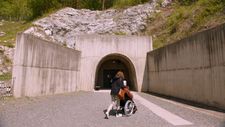 |
| Colette Marin-Catherine mentions Dante when she and Lucie Fouble are going into the V-2 rocket tunnel. |
AKT: I noticed she mentions Dante at one point.
AG: Right! When they are going into the tunnel. When we got the nomination, she had prepared a little speech for us and one line really stuck out to me. She said, in essence, that without the efforts to have this film made, “I’m grateful for that, because Jean-Pierre is no longer lost in the night and fog of Dora.” Which I thought was an incredible statement.
AKT: And she is linking it to Nuit Et Brouillard, the Alain Resnais film!
AD: Yes, yes, exactly that.
AG: Yes, it’s almost like this Eternal Return kind of thing. As if you’re constantly finding things again in new ways.
AKT: Now that you mention this - I only met Alain Robbe-Grillet once and he asked me twice to translate the Eternal Return for him.
AG: What is it, die ewige Rückkehr?
AKT: Die ewige Wiederkehr. It’s funny that you are bringing this up. Also in your film, the symmetry that both Colette and Lucie are limping!
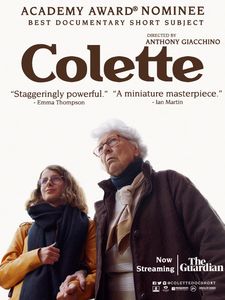 |
| Colette poster |
AG: Lucie had an injury before she came.
AD: Nothing to do with us!
AG: Handball; she was just playing sports and hurt herself. But that is interesting, for sure.
AD: Anne-Katrin, you see things! That we love.
Coming up - Alice Doyard and Anthony Giacchino on the doublings, the mirroring, Colette Marin-Catherine and Lucie Fouble’s exchanges, the night and fog of Dora, and a Thomas Pynchon Gravity’s Rainbow reading assignment.
At the French Institute Alliance Française in New York on Thursday, April 1 at 7:00pm (NYC time) there will be a free virtual screening of Colette followed by a pre-recorded online discussion with Colette Marin-Catherine, Lucie Fouble, Anthony Giacchino, and Alice Doyard.
The 93rd Academy Awards ceremony will be held on Sunday, April 25, 2021, at the Dolby Theatre at Hollywood & Highland Center in Hollywood, and will be televised live on the ABC Television Network. The Oscars also will be televised live in more than 225 countries and territories worldwide.








